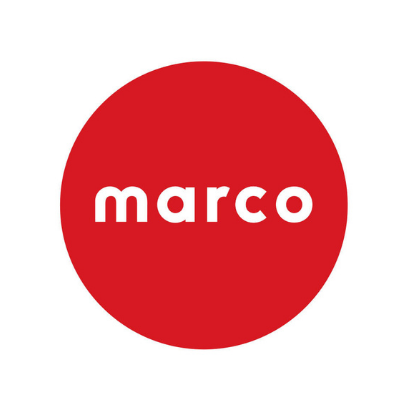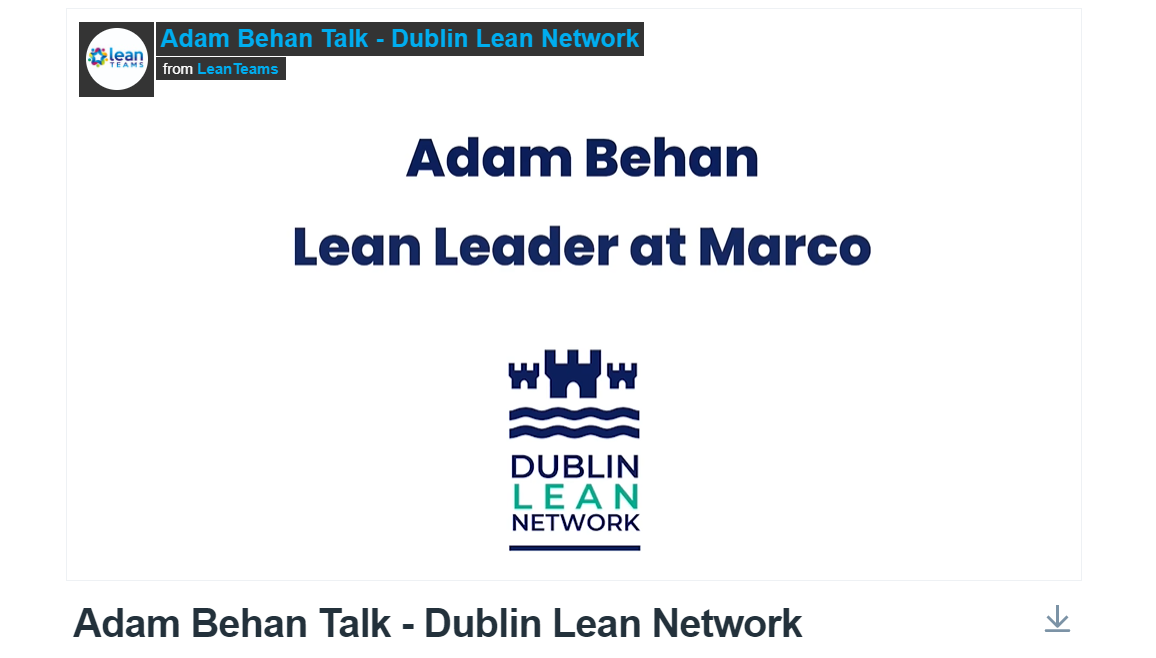

The event
In April, we welcomed Adam Behan from Marco Beverage Systems to talk to the Dublin Lean Network about Effective Meetings.
Adam Behan joined Marco Beverage Systems in 2014 as a Production Engineer and soon became a Lean Leader in 2019. He is a Mechanical Engineer, a Lean Black Belt and a Certified Coach.
Press play to view the webinar recording or read on for a short summary.
Company Background
By way of background, Marco Beverage Systems have 7 global offices with 2 manufacturing sites – one in Dublin and the other in Ningbo, China. They also have a global presence in over 65 countries worldwide. They have plans to expand in to South America, Africa and Greenland. The company’s purpose is to re-imagine beverage excellence everywhere and their people make this purpose happen.
Marco Beverage Systems work with their partners, distributors, communities and customers to deliver their promise. The company’s core values include knowledge, integrity, innovation, passion and care.

Why Effective Meetings?
One of Adam’s first projects as a Lean Leader was Effective Meetings. This has proved to be an important project for the company from a cultural and operational point of view. Using the Mór Benchmarking Tool, this allowed them to asses themselves in terms of operational excellence.
Next, Adam showed us an example of a Project Charter including:
- Who was involved in the Project Team.
- Business need / Justification / Strategic Theme.
- The Current State.
- Risks and Assumptions.
- Project Scope.
- Expected Cost.
- Expected Start Date and Finish Date.
As a result of this internal analysis, they discovered that Meeting Effectiveness ranked the lowest score. Now that they had a measurable result, Adam set about improving the way they ran their meetings using the DMAIC model (below).

The company had no clear standards for before, during or after a meeting. In fact, they reported that they had 79 regular routine meetings and this did not include ad-hoc meetings. At the time of this project, they had 59 staff members in MBS.

During their analysis of the situation, Adam found that there was no agenda and minutes of the previous meeting were not shared after meetings. In reality, it was very unclear who owned the relevant actions and meetings often dragged on because latecomers were updated on what was already discussed. In addition, phones and laptops were used regularly during meetings which were not actually part of the meeting. Finally, the company used multiple meeting platforms.
Essentially, there was no set standard or process as to how they ran their meetings at Marco Beverage Systems. What Adam also discovered during their analysis was that 25% of the people were attending 77% of the meetings. Having identified these people, they were better able to focus on their behaviours.

In order to improve their meetings, all meetings were put into 3 categories:
- PIT (Progress, Issues, Targets): They are regular, recurring and quick (15 mins maximum)
- Business Critical: These meetings have a defined lifespan and are linked to Marco’s business strategy via Hoshin, Project or Kaizen. Furthermore, they must have an update progress against the plan. They can also highlight issues and give an update progress of corrective actions.
- 1 on 1: These meetings do not end and are usually with a manager. They can give an opportunity for coaching or development. Many of these meetings deal with issues at a high level and can be confidential in nature.
As part of their Standard Work, they drew up a list of agreed behaviours including positive meeting etiquette and how to chair a meeting. Finally, they standardised their online meeting platforms and they decided to use Microsoft Teams for all online meetings.
Next, they used LMS to ensure that all staff at the various Marco sites used the same standardised process for meetings – this also included newcomers to the business.
In 2021, they conducted another Mór Benchmarking analysis. During this analysis, their employees went from a score of 1 out of 4 for Meeting Effectiveness to 3.5 out of 4. This was their highest score to date. They have found that this project has made the business run more smoothly and more efficiently.

So, what did Adam and his team learn from this project? Lean tools are versatile – for this project, Adam used DMAIC, Fishbone Diagram, Pareto, Go to the Gemba and Standard Work. Communication was key to the success of this project. Agreeing the standards with the team and sticking to them was another key component.
Adam’s takeaway tips are as follows:
- Standardise the basics – agendas, minutes, chairing the meetings, positive meeting etiquette, online meeting platform.
- The same rules should apply across all levels of the organisation.
- Do not recap discussions for anyone who arrives late without prior notice – regardless of their role in the company. This rewards lateness and disrespects those who attend on time.
- Reviewing meetings can lead to reducing meetings.
- Training for all staff is crucial.
- Periodic audits are helpful to promote continuous improvement.
Following Adam’s talk, we had a very interesting Q & A session and then we opened up 3 breakout rooms when we discussed:
- Ongoing challenges with meetings.
- How to apply Lean tools to non-manufacturing processes.
- Virtual meetings.
Next Webinar
Our next webinar is with Steven Spear on Thursday 12th May at 1pm when he will be talking about “How to achieve rapid process improvements in your organisation”.
Register for the Dublin Lean Network and to receive emails about this webinar and company site visits here
About Steven J. Spear
Steven Spear (DBA MS MS) is author of the award winning and critically acclaimed book, The High Velocity Edge. He is a Senior Lecturer at MIT Sloan School of Management and is a Senior Fellow at the Institute for Healthcare Improvement. In addition, Steven is also a founder of See to Solve Corp, a business process software company.
An expert about how ‘high velocity organizations’ generate and sustain advantage, Spear has worked with clients spanning high tech and heavy industry, software and healthcare, and new production design and manufacturing.
He helped develop and deploy the Alcoa Business System, which recorded hundreds of millions of dollars in operating savings, and he was integral in developing the ‘Perfecting Patient Care’ system for the Pittsburgh Regional Healthcare Initiative. PRHI hospitals scored well documented reductions and eliminations of scourges like central line associated infections, surgical site infections, and patient falls. Spear’s research served as the basis for significant programs at companies like Intel, Pratt and Whitney and GSK.
He has been advisor to a Secretary of the Treasury, a Chief of Naval Operations, the director of the Army’s Rapid Equipping Force and a number of corporate leaders.
Spear helped design and deploy the Navy’s “high velocity learning” line of effort.
Spear has published in the NY Times, the Boston Globe, Annals of Internal Medicine, and Academic Medicine, and he has spoken to audiences ranging from the Association for Manufacturing Excellence to the Institute of Medicine.
His 1999 Harvard Business Review article, “Decoding the DNA of the Toyota Production System,” is part of the ‘lean manufacturing’ canon, and “Fixing Healthcare from the Inside, Today” was an HBR McKinsey Award winner in 2005 and one of his four articles to win a Shingo Research Prize.
Steven has a doctorate from Harvard Business School, masters in engineering and masters in management from MIT, and a bachelor’s degree in economics from Princeton.
This blog post was written by Trish Ferguson, Steering Committee Member of the Dublin Lean Network.


